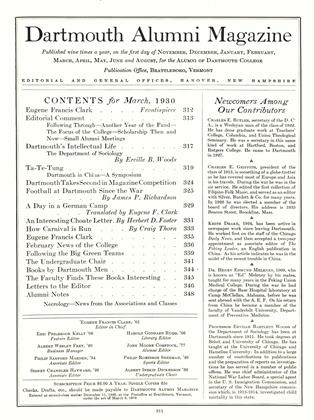AWAKDS for articles in Alumni Publications in America have been announced for the year L 1929. Dartmouth takes second place in the group entitled "The best article or story based on the work of some alumna or alumnus," the award going to the article Richard Hovey, Barnstormer, by Fordyce P. Cleaves 'B7 in the March, 1929, number. The complete classifications and awards follow:
A—The best editorial.B—The best write-up of some original idea inalumni work.C—The best article or story based on the achievement or work of some alumna or alumnus.At the close of the competition, the followingawards were made:
CLASS A
First Place: "They were calling it Wooster Day."College of Wooster, Ohio.Second Place: "He Died." Worcester Tech,Mass.
Third Place: "Columbia Proud of her GreatCrew." Columbia.
CLASS B
First Place: "Atlanta Seniors Spend Day atWesleyan." Wesleyan College, Georgia.
Second Place: "On Our Sixtieth Birthday."Boston University, Mass.
Third Place: "Keeping in Touch." Universityof California.
CLASS C
First Place: "The Vitamine Marathon: anInterview with Dr. Joseph Yoshicka." CaliforniaMonthly.
Second Place: "Richard Hovey, Barnstormer."Dartmouth.
Third Place: "When Pluck Beats Luck." Bowdoin, Maine.
Mr. Cleaves presented in his article a side of Richard Hovey's life but little known to the average American critic. And in the same connection it may be said that another side is presented by Mr. Laing in the February MAGAZINE. Lest the alumnus of the college feel that too much attention is paid by the MAGAZINE to one Dartmouth poet, it might be said that Hovey has never received the real credit due him. At a time when American poetry had fallen off to Fin-de-Siecle and Versde-Societe Hovey brought into American literature a wholly new note, almost revolutionary.
The awards for meritorious articles is but one feature of the work of the American Alumni Council which is growing in strength as an organization year by year. Interest of alumni groups in their own magazines has now reached a point where the alumni publication is expected to perform two definite purposes, namely: to keep the alumni in touch with their own college and the collegiate world in general, and also to keep members of various classes in touch with each other individually. Colleges and universities in the past ten years have so extended their interests out of particular sections of the country that some information is absolutely necessary from time to time if the graduates wish to keep posted on college matters. News of the classes, editorial comment, extensions of the curriculum, athletics, new books and records of the work of individuals all form part of the news demands of an alumni body. In order that the publications which fill these wants shall have standards that reflect the best publishing ethics, the awards committee has been established. This plan received its initiation in the college year of 1928-1929 under the able guidance of the following committee: J. L. Morrill, Ohio State University; Carl Stephens, University of Illinois; Edith N. Hill, Smith College. Sixty-eight magazines entered the competition.
The Committee that made these awards has passed on word to the new Committee that it considers the competition distinctly worth while, since it believes that such competitions will develop keenness on the part of editors besides raising the standards of magazines. The Committee mentions a college that conducted an all-alumnae contest for the best writing for its particular magazine in order that the magazine might worthily compete with the other alumni magazines.
In accordance with suggestions made by last year s committee, changes have been made in the classes of material asked for. These are incorporated in the following regulations: (1) Each magazine is invited to send in contributions for a competition for A—The best editorial of the year (1929-1930). B—The best feature article. C—The best article of general literary excellence. (2) All contributions must be in the hands of the Committee prior to April 15, 1930. (3) In order that contributions may cover the college cycle they may be selected from issues published from April, 1929, to April, 1930, inclusive. (4) Each magazine is asked to submit but one entry in any one class. (5) Contributions may be addressed to any one of the Committee. Eric P. Kelly, Chairman, Dartmouth College, Hanover, New Hampshire; Alfarata B. Hilton, 13 Denton Road West, Wellesley, Massachusetts; Donald A. Roberts, The College of the City of New York, New York City, N. Y.
 View Full Issue
View Full Issue
More From This Issue
-
 Class Notes
Class NotesCLASS OF 1909
March 1930 By Robert J. Holmes -
 Class Notes
Class NotesCLASS OF 1923
March 1930 By Truman T. Metzel -
 Article
ArticleTa-Te-Tung
March 1930 By Charles E. Butler -
 Lettter from the Editor
Lettter from the EditorEditorial Comment
March 1930 -
 Sports
SportsFootball at Dartmouth Since the War
March 1930 By James P. Richardson -
 Article
ArticleHow Carnival is Run
March 1930 By Craig Thorn







